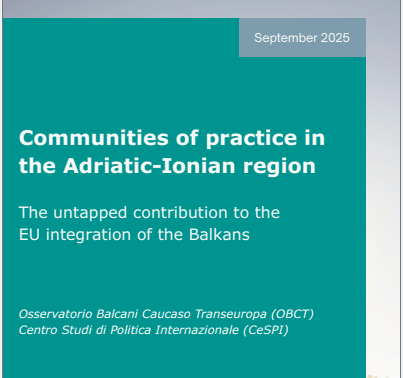Communities of Practice in the Adriatic-Ionian Region: research findings
In a new study recently published, OBCT and CeSPI explore the untapped contribution of communities of practice to the EU integration of the Western Balkans

Communities-of-Practice-in-the-Adriatic-Ionian-Region-research-findings
The research examined the role of communities of practice, understood as groups of professionals involved in Interreg projects and in the policy spaces of the EU Strategy for the Adriatic and Ionian Region (EUSAIR), in supporting the European integration process of the Western Balkans.
The results show that, in the Adriatic-Ionian macro-region, communities of practice are formed around concrete issues such as environmental protection, sustainable tourism, connectivity, and innovation. In these contexts, professionals share skills, experiences, and operational practices, creating lasting transnational links and indirectly contributing to European integration “from the bottom up.”
A key factor facilitating these transnational collaborations is EU funding, particularly from the Interreg IPA Adrion programme. Many of the stakeholders interviewed for this research recognize EU funds as the main driver of cooperation. However, this funding is often considered insufficient to go beyond pilot projects and generate a systemic impact on public policies.
Indeed, the main finding of the research highlights how difficult it is to translate the results of Interreg projects into strategic policies or reforms, also due to the limited opportunities for professionals to interact with public decision-makers and actively participate in decision-making processes.
At the same time, European integration rarely emerges as an explicit theme in the work of our interlocutors. Projects are mainly perceived as concrete initiatives, without a direct link to EU enlargement. As a result, the progress made in these areas is almost never recognized as a concrete contribution to European integration, even when it is.
Communities of practice are, therefore, an important but undervalued resource. Embodying the concept of “everyday integration from below”, they have the potential to complement the political level by placing the needs of the territories involved at the heart of transnational cooperation.
To unlock this potential, the research proposes recommendations for national and European policy-makers, inviting them to devise ways to integrate the practitioners and their knowledge into the decision-making processes related to the Western Balkans’ European integration.
The research is available in English at this link: https://staging7.balcanicaucaso.org/wp-content/uploads/sites/8/2025/10/CommunitiesofpracticeintheAdriaticandIonianregionTheuntappedcontributiontotheEUintegrationoftheBalkans.pdf
This research was written as part of the project "Il contributo delle Comunità di Pratica per l’integrazione europea dei Balcani”, funded by the Ministry of Foreign Affairs and International Cooperation. The opinions expressed in this publication are those of the authors and do not necessarily represent the positions of the Ministry of Foreign Affairs and International Cooperation. It was also supported by a Marie Curie Staff Exchange within the Horizon Europe Programme (grant acronym: ORCA, no: 101182752).




